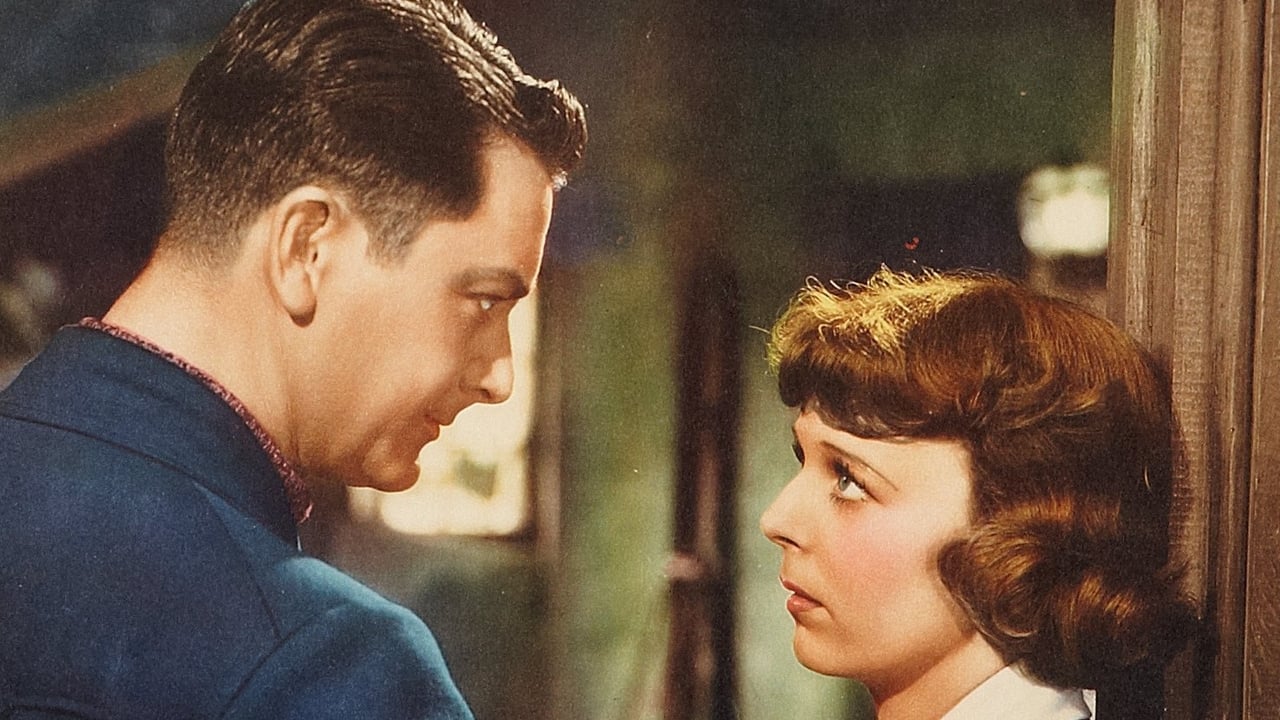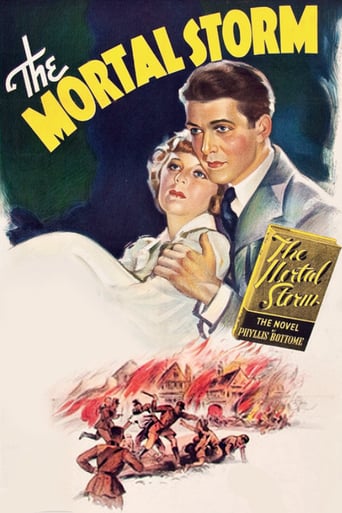

The Mortal Storm (1940) is a powerful film that reveals the tenets of fascism, and specifically that which would overtake the Europe of its time. It opens with some narration that ends with a question (the title of this review) in "January 1933 (in) A small university town at the foot of the Alps in southern Germany".It's a day of celebration, Professor Viktor Roth (Frank Morgan) is turning 60; he's a well respected man in his household, by his family and friends, and among his colleagues and students at the university, where he teaches science. On this special day, many show Viktor their love, including his daughter Freya (Margaret Sullavan), or speak his praises, including one of his top students Fritz Marberg (Robert Young), who does so in front of perhaps the entire university in his jam-packed classroom, and a longtime family friend Martin Breitner (James Stewart), who's a farmer.However, that day, January 30, 1933, is also the day that Adolf Hitler was named chancellor of Germany, and the Roth's dinner celebration of Viktor's birthday turns sour: Fritz, who's just claimed Freya as his fiancée, and her stepbrothers Otto and Erich (Robert Stack and William T. Orr, respectively) receive the news of Hitler's appointment with great enthusiasm while most of the others do not. Besides Viktor, it's Martin - who'd had designs on Freya himself and was just as shocked by Fritz's claim of her as she was - that appears to be the least excited about it.This division of family continues because Viktor is non-Aryan, so his life is soon in danger, despite the fact of his laudable reputation within the community. Flags with swastikas soon appear and Fritz, Otto and Erich are caught up in a sick kind of patriotism that finds them persecuting another non-Aryan Professor Werner (Thomas W. Ross) at the urging of the fanatical Holl (Dan Dailey in his film debut), before turning on Martin - who publicly defends Werner before helping him escape to neighboring Innsbruck - and finally Viktor, who's arrested in August. When winter comes again, Viktor dies in prison, and his wife Emilia (Irene Rich) also leaves for Austria.Freya had long rejected Fritz and his politics, before their town had devolved into a more threatening and violent environment for anyone that resisted the Nazi party or wouldn't return in kind the "Heil Hitler" salute. That included Elsa (Bonita Granville), an hysterical teenager working on the Breitner's farm with Martin's mother Hilda (Maria Ouspenskaya); they're bullied by a thuggish partisan soldier named Franz (Ward Bond).When Martin daringly returns, he and Freya have a brief romantic moment with Hilda, before attempting an escape on skis. Fritz's commander forces him to decide whether to show loyalty to the Fuhrer or former friends by leading his fellow soldiers to intercept them. The party wins out, and Fritz is responsible for Freya's murder. He guiltily confesses it to Otto and Erich claiming "he had no choice" while Otto laments how much their lives have changed.
... View MoreSincere, moving story about the Nazi takeover in Germany and its affect on one family in particular. The father (Frank Morgan) is sent to a concentration camp. His stepsons become ardent Nazis, as does the man who was supposed to marry his daughter (Margaret Sullavan). This also drives a wedge between the sons and a lifelong friend (James Stewart), who is in love with Sullavan.Beautifully acted with fine performances from all. Stewart and Sullavan are amazing. Robert Young, usually playing good guy parts, here plays a Nazi. Bonita Granville does well, as does Ward Bond in a villainous part. Maria Ouspenskaya is brilliant as usual. But the best kudos would have to go to Frank Morgan for his sensitive, intelligent performance. Possibly the finest of his career. Robert Stack also appears as one of the Nazi stepsons and plays a part in the film's powerful final scene.This is truly a classic in every sense of the word. It's a movie that should be seen by everybody, both for its content as well as its historical value.
... View MoreFrank Borsage directed this powerful and still timely drama set in 1933 Germany, in a little village in the Alps, where respected Professor Roth(played by Frank Morgan) is having his birthday(Jan. 30) observed by his family and students. Things are happy until the results of the national election are announced, with Hitler and his Nazi party the overwhelming winners. This creates a wave of pro-Nazi zealotry that ends up dividing the family. Daughter Freya(played by Margaret Sullivan) is torn between two suitors(played by Robert Young and James Stewart). When her father is arrested and later dies in prison, Freya chooses Stewart because he hates the Nazis, but he is also a fugitive, as is her whole family, leading to a fateful ski trip escape down the mountains to freedom across the border...also costars Robert Stack, Ward Bond, and Bonita Granville.Still potent film shows in chilling and shocking detail how blind party loyalty can grip a nation, turning friends and family against each other because they dare question their own government, a problem that has not gone away, but merely changes form... Only a vigilant and informed citizenry can prevent such a thing from happening again.
... View MoreJust imagine what it must have been like to sit in a theater and watch this movie when it came out on June 14, 1940! The bombing of Pearl Harbor was a long way off, and most of us wouldn't even have known where it was. But we would know that there was a war raging in Europe, Asia and elsewhere. Besides radio and newspapers, we got our news then from movie theater newsreels. And we likely would have just seen a newsreel of Germany's invasion of France on June 5 and launch of its North Africa campaign on June 10. "How much longer would it be before the U.S. is drawn into this war?" we might wonder. It seemed to be spreading fast now. In April and May, Germany had invaded Norway, Holland and Belgium. More and more, pacifists began to realize that the U.S. and other peaceful and neutral counties would not be able to escape this war. Germany had annexed Austria and Czechoslovakia in 1938, and invaded Poland on Sept. 1, 1939. England and France could no longer ignore Adolph Hitler's intentions by then, so they declared war on Germany. On the other side of the world, Japan was spreading its conquests in Asia since invading China in 1937.So, that was the world war picture when "The Mortal Storm" hit theaters. The film was based on a 1938 novel by Phyllis Bottome (1884-1963). She was an English author and teacher who studied psychology and languages. In 1917, she married Alban Dennis, a British diplomat and intelligence officer. They worked and lived in Austria, Germany and England, including a time when they owned a language school in Austria. Bottome surely knew a lot about Europe, World War I and the rise of Adolph Hitler and Nazi Germany. She shows that in her novel that was made into this 1940 movie. The story takes place in 1933 in a small college town in Bavaria, close to the Austrian border. It's the 60th birthday of Professor Roth, played by Frank Morgan. He is a highly respected man of science who teaches chemistry. Students and faculty members surprise him with recognition at the college that day. That evening, the family and two young men friends of the family celebrate with a birthday dinner at the professor's home. The radio is on in the background and the announcer reports that Adolf Hitler has just been appointed chancellor of Germany. That makes the date January 30, 1933.The two oldest stepsons and a family friend played by Robert Young are ecstatic about the news. They head off to celebrate with fellow brown shirts. The professor, his daughter Freya, played by Margaret Sullavan, and friend Martin Breitner, played by James Stewart, are not happy about the news report. The mother and the youngest son don't react to the report, but want the birthday party to continue.Others have noted some subtle treatments in the film. It doesn't use the word, "Nazi," and only names Germany once. That may have been necessary to get the film produced, but everyone knew who the references were to.Before long, the professor is shunned by fellow faculty and students for his anti-Nazi attitude and for teaching the facts of science. He is arrested and put in a concentration camp. This would have been Dachau – just 10 miles northwest of Munich. It was the first Nazi concentration camp for political prisoners and opened in March, 1933. The rest of the film shows how the family and friends are split apart over Nazism. "The Mortal Storm" may be the best historical, prophetic and insightful film ever made about World War II. The movie is excellent itself in its plot, the script, acting and directing. But there is much more to this film than people have commented on so far. It is a warning to the world about evils such as Nazism and how they destroy all that is good – families, homes, communities, love, trust and decency.The scene that shows students burning the college library books that don't agree with Nazism was a perfect picture of how such evil can poison a population – and build fervor especially among people who are ignorant and don't know or see the dangers. That's why it is so important for those who have strong beliefs, reasons and knowledge to stand up and speak to the masses of society – to defend freedom and explain the threats posed to it.The film seems to be a valid warning to people of all times that such evil is able to arise only through the apathy of people. The irony in "The Mortal Storm," is that the one who should know that best, and who was in a position to be heard and to make a difference, became the first to be persecuted because of his apathy. That was the professor himself. Remember from the family gathering and the different views among the young people about Nazism? The professor says that everyone should respect the others for their views. But he never challenges the loud views expressed by the pro-Nazi members of the family. There's an old saying, attributed to various sources, that if we don't learn from history, we are doomed to repeat it. Another saying, attributed to Edmund Burke, says, "All it takes for evil to flourish is for good men to do nothing." Perhaps that's the message the author and film makers wanted to get across in "The Mortal Storm." Can we not see some of these same threats today, in government and public attacks on such basic freedoms and rights as speech, religion and life? Unless we learn from history, we may certainly have to live – and die – in another "Mortal Storm."
... View More